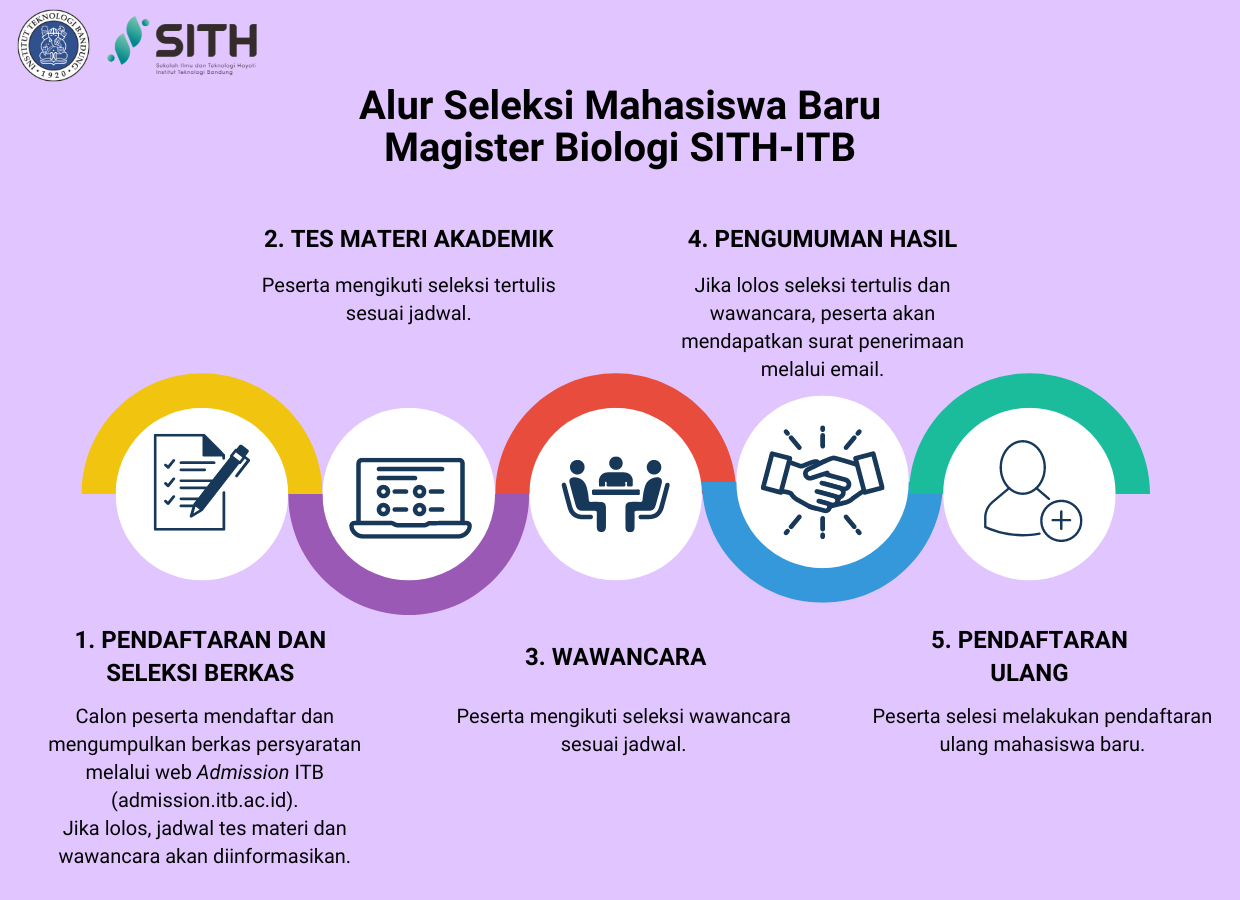Admission Process

The Master's Program in Biology has a quota of 40 students for the 2023/2024 academic year.
Jadwal Pendaftaran Calon Mahasiswa Program Pascasarjana ITB untuk semester I tahun 2023/2024 adalah sebagai berikut.
| Activity | Round I | Round III | Round V | Round VI |
| Registration | February 1 – 25, 2023 | March 28 – April 18, 2023 | May 30 – June 24, 2023 | June 27 – July 15, 2023 |
| Selection in the Study Program | February 28 – March 10, 2023 | May 2 – 12, 2023 | June 27 – July 5, 2023 | July 18 – 21, 2023 |
| Announcement of Selection Results | March 17, 2023 | May 24, 2023 | July 12, 2023 | July 28, 2023 |
| New Student Re-Enrollment (Online) | April 17 – 28, 2023 | June 19 – 30, 2023 | July 24 – August 5, 2023 | July 31 – August 5, 2023 |
| BPP payments | May 2 – 20, 2023 | July 3 – 22, 2023 | August 7 – 10, 2023 | August 7 – 10, 2023 |
| Open Session | August 14, 2023 | August 14, 2023 | August 14, 2023 | August 14, 2023 |
| First Academic Advisory | August 8 – 15, 2023 | August 8 – 15, 2023 | August 12 – 15, 2023 | August 12 – 15, 2023 |
| First Day of Classes | August 21, 2023 | August 21, 2023 | August 21, 2023 | August 21, 2023 |
To proceed with admission, please first register at the following link.
If you do not have a TPA certificate, you can participate in a TPA held directly by BAPPENAS. Please see the following page for more details.
PSDM – Institut Teknologi Bandung (itb.ac.id)
If you do not have a TPA certificate, you can participate in a TPA held directly by BAPPENAS. Please see the following page for more details.
Please see the following page for more information on admission.
ITB Admission – Masters Program
At the study program level, selection consists of two stages: the academic test (TMA) and interview.
A. Materials for the academic test are as follows.
- General
- Life (prokaryotes and eukaryotes)
- Animal and plant cells
- Classification
- DNA
- Animal cells and tissues
- Respiratory metabolism
- Photosynthesis
- Development
- Genetics
- Evolution
- Microbiology
- Biodiversity
- Populations
- Ecosystems
- Biosphere
- Specific for Environmental Biology
- Environmental science
- Population biology
- Ecosystem Analysis
- Biodiversity dan evolution
- Ecological Methods
- Specific for Molecular, Cell, and Organismal Biology
- Cell biology and microbiology
- Genetic engineering
- Physiology
- Development
- Methods
B. Materials for the interview are as follows.
- Motivation
- Research direction
- Prospective student insights: understanding of areas of interest and reasons for research interest (theoretical and applicable)
- Work/research experience
- Funding/sponsorship
- Non-technical limitations
